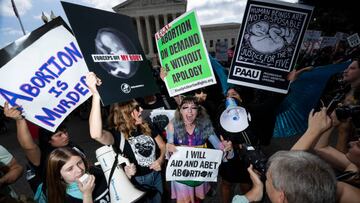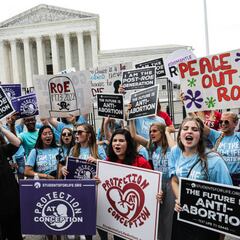In which states are abortions illegal after US Supreme Court overturned Roe v. Wade?
Following the US Supreme Court’s decision to overturn Roe v. Wade, 13 states with trigger laws in place can enact legislation to ban or severely limit abortion.

The decision of the US Supreme Court to overturn the landmark 1973 Roe v Wade ruling has paved the way for US states to enact legislation almost completely banning abortion or heavily restricting access to the procedure. The Guttmacher Institute, a US-based independent pro-choice research NGO, estimates that up to 26 states are either certain or likely to impose new laws severely limiting access to abortion procedures or putting outright bans in place, with very few exceptions.
“It’s going to be a real nightmare,” Greer Donley, a professor specializing in reproductive health care at the University of Pittsburgh Law School, told Politico (which provides an interactive map of the abortion status in US states post-Roe). “Literally, all I do all day is think about abortion law. It’s my only job. And there’s questions that I can’t answer.”
Those states with so-called trigger laws already in place can act very quickly to impose draconian new legislation in the aftermath of the Supreme Court ruling. Some of these trigger laws will lead to almost blanket bans on abortion, while others will outlaw abortion after six weeks or 15 weeks of a term. In Arkansas, for example, as soon as the state attorney general certifies the Supreme Court’s overturning of Roe v Wade, the trigger law will come into effect, according to the Guttmacher Institute. In Texas, a near-total ban will come into effect 30 days after Friday’s ruling.
The Guttmacher Institute lists the 13 states with trigger laws in place as: Arkansas, Idaho, Kentucky, Louisiana, Mississippi, Missouri, North Dakota, Oklahoma, South Dakota, Tennessee, Texas, Utah and Wyoming. Of these only South Dakota, Louisiana and Kentucky have trigger laws in place that will lead to an immediate ban on most abortions.
Most states where abortion will still be legal are on the West Coast (California, Nevada, Oregon and Washington) or in the Northeast. Governor Gavin Newsom of California, the most populous state, proposed enshrining a right to abortion in the state’s constitution.
A handful of states in the Midwest and Southwest are expected to keep abortion legal such as Illinois, Kansas, Minnesota and New Mexico, according to the Guttmacher Institute.
Colorado, Connecticut, Maryland, New Jersey and Vermont have passed legislation this year seeking to protect or expand abortion access.
President Biden addresses the Supreme Court decision overturning Roe v. Wade. https://t.co/cV6mLIXC1Y https://t.co/mNHqW0CsdX
— POLITICO (@politico) June 24, 2022
What are trigger laws?
According to the Guttmacher Institute, those states with trigger laws in place “establish a legal path for states’ pre-1973 abortion bans, as well as currently unenforced post-1973 bans, to take effect.”
Related stories
The 13 states in question enacted trigger laws to be implemented in the event that Roe v Wade was ever overturned, which will now theoretically pass into legislation either automatically or through swift state action. As the Guttmacher Institute notes, “most trigger bans include very limited exceptions, but those are difficult if not impossible for people seeking abortion to qualify for in real life, and mainly serve to make a draconian policy seem slightly less cruel.”
The decision—which will immediately launch the advent of “trigger laws” in 13 states—was anticipated since a leaked draft. It will roll back 50 years of profound changes in the lives of women in the US, and in the structures and wellbeing of families: https://t.co/SIzspZiMlw pic.twitter.com/xhtgeqEgPb
— WIRED (@WIRED) June 24, 2022
In what instances will abortion be permitted in trigger law states?
With Roe v Wade now overturned, the 13 states with trigger laws in place can enact near-total bans on abortion. State-by-state, those exceptions, under the current terms of the trigger laws, are as follows.
- Arkansas: Illegal unless in cases where there is a “medical emergency;”
- Idaho: Illegal unless the mother’s life is threatened or in cases of rape or incest if a crime is reported;
- Kentucky: Illegal unless to save the life of the mother;
- Louisiana: Illegal unless to save the life of the mother;
- Mississippi: Illegal unless a rape has been reported and to save the mother’s life;
- Missouri: Illegal unless to save the life of the mother;
- North Dakota: Illegal except in cases of rape or incest or if the life of the mother is at risk;
- Oklahoma: Illegal;
- South Dakota: Illegal unless to save the life of the mother;
- Tennessee: Illegal unless to save the life of the mother;
- Texas: Illegal unless to save the life of the mother
- Utah: Abortion is available in cases of rape or incest if a crime is reported, and also available to save the life of the woman or if the fetus has a fatal congenital disability;
- Wyoming: Abortion is available in cases of rape or incest and to save the life of the woman.

